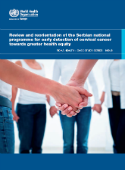Review and reorientation of the Serbian national programme for early detection of cervical cancer towards greater health equity (2015)

Download
Roma Health – Case Study Series No. 3
2015, x + 32 pages
ISBN 978 92 890 5094 4
Studies conducted in Serbia and worldwide concluded that socioeconomic determinants of health – such as gender, wealth, ethnicity and living conditions – are strongly associated with health status. Recognized inequalities in health due to differences in socioeconomic status require a structured institutional response and multisectoral actions at many levels. The WHO Regional Office for Europe proposed using methodology developed to review and reorient national strategies, programmes and actions towards greater equity. The Serbian Ministry of Health appointed a working team to review the chosen programme: the national programme for early detection of cervical cancer.
This case study presents the review of the programme, which identified Roma women and other groups who might not benefit from it owing to barriers at many levels. Along with analysing barriers, it also identifies factors that might facilitate access to this programme. Key recommendations include the need for a multidisciplinary approach focusing on social determinants of health, and intersectoral collaboration among different stakeholders at the national, regional and community levels.



